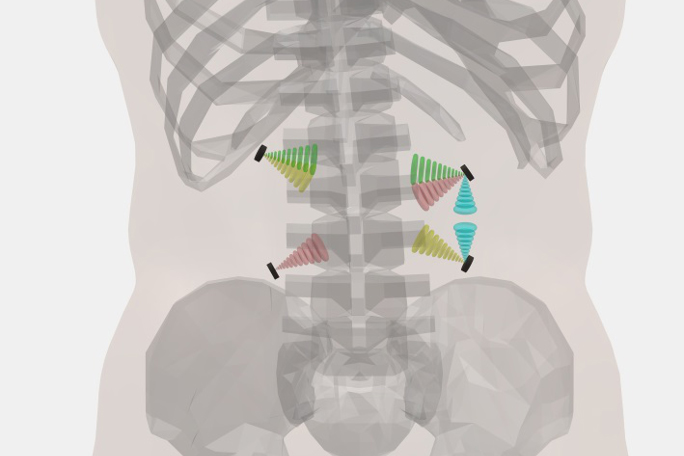Innovation driver digitization - "Smart Health“
I-call - When microimplants communicate with each other
Microelectronics as a key technology enables numerous innovations in the field of intelligent medical technology. The Fraunhofer Institute for Biomedical Engineering IBMT coordinates the BMBF cooperative project "I-call" realizing the first electronic system for ultrasound-based, safe and interference-resistant data transmission between implants in the human body.


When microelectronic systems are used for medical applications, they have to meet high requirements in terms of biocompatibility, reliability, energy consumption and integration capability. In many cases, diverse and heterogeneous components such as sensor and actuator assemblies as well as components for signal processing, communication and energy generation interact to create the technological basis for improved patient care.
At the beginning of 2018, the BMBF cooperative project "I-call – Microelectro-mechanical system for acoustic communication between implants", coordinated by the Fraunhofer Institute for Biomedical Engineering IBMT, started. "I-call" aims at developing the first electronic system for ultrasound-based, multi-channel, safe and interference-resistant signal and data transmission between implants in the human body. So-called capacitive micro-machined ultrasonic transducers (cMUTs), as known from ultrasound-based imaging, generate and detect high-frequency ultrasonic signals that can propagate over long distances in the body. These highly miniaturized transducers can be integrated directly into the circuits (ASICs) used. In addition to the custom-made cMUTs for wireless communication and special ASICs that drive the cMUTs and process the ultrasound signals, the “I-call" consortium is developing communication protocols for communication via ultrasound. To compensate for interference caused by noise and echoes, "I-call" uses a method of acoustic communication that mimics the "singing" of dolphins and whales. The signal energy is distributed over a wide frequency range by a continuous frequency change and converted back into narrow-band signals at the receiver. The cMUTs, known as particularly broadband ultrasonic transducers, are ideally suited for this method. Even though the cMUTs made of silicon are biocompatible per se and thus suitable for implantation, unlike established ultrasonic transducers, they are primarily used in a hermetic metal housing (e.g. made of titanium) and are thus protected against damage. Various housing geometries and methods for sound coupling are being investigated and further developed with regard to their suitability to guarantee a long-term stable, biocompatible signal transmission. This is particularly important for increasing the performance of neuroprostheses, since in this area several implant units transmit large data streams in parallel.
Implantable systems with distributed intelligence
The Fraunhofer IBMT contributes its long-time expertise in the development of biomedical microsystems and ultrasonic transducers and is responsible for the simulation and realization of cMUTs in bulk micromechanics as well as their characterization. In addition, the scientists and engineers are developing the implant electronics and the firmware necessary for controlling the implant communication.
With this innovative technological approach, future implantable systems with distributed intelligence will become possible. The use of highly integrated cMUTs in implants and their ultrasound-compatible housing are particularly forward-looking. The use of ultrasound for communication is excellently suited for use in the body, which consists mainly of water, and offers advantages over communication with electromagnetic signals, such as a long range in the body despite its small size, practically no attenuation due to a titanium housing, and a high degree of security against eavesdropping.
Coordinator
Fraunhofer Institute for Biomedical Engineering IBMT, Sulzbach/Saar, Germany
Partners (Germany)
PREMA Semiconductor GmbH, Mainz
EvoLogics GmbH, Berlin
microFab Service GmbH, Bremen
OSYPKA AG, Rheinfelden
PlascoTec GmbH, Wuppertal
Funding: BMBF 16ES0752K
Funding period: 01/2018-12/2020
Funding volume: € 3.74 million